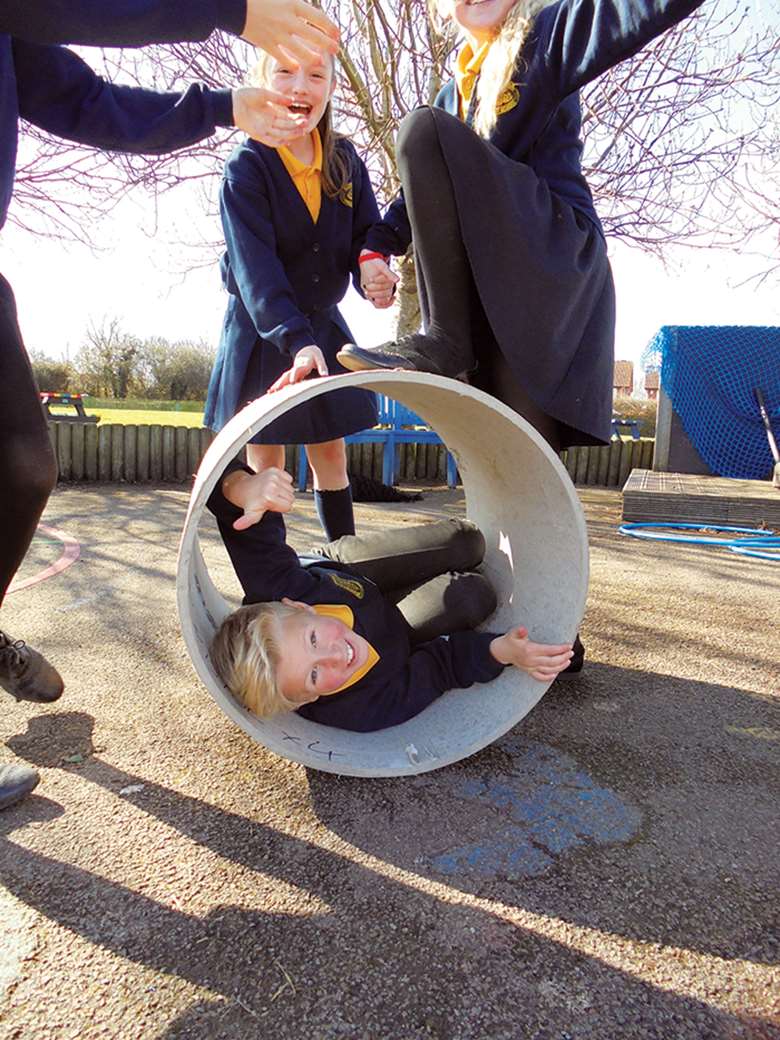Scrapstore PlayPods
Gabriella Jozwiak
Wednesday, May 31, 2017
Charity Children's Scrapstore provides schools with safe waste materials as alternative play equipment.

- The scheme has been shown to boost pupils' creativity, socialisation and physical activity
- Teachers also report improvements in children's readiness to learn, and skills development such as trial and error
ACTION
When children returned to Greatfield Park Primary School in Cheltenham after this year's Easter holidays, they found a 15 square-metre, bright blue steel shed in their playground. The words "Scrapstore PlayPod" were painted on the front. "What's that?" they asked. Head teacher Nikki Hill said: "I don't know, what do you think?" Thus began the school's new creative style of play and learning.
Two weeks later, the PlayPod officially opened. Created by Bristol-based charity Children's Scrapstore, the shed contained clean, safe and non-hazardous business waste materials for pupils to play with, such as car tyres, crates, cardboard tubes, electronic equipment or wood cut-offs.
The scheme was developed in 2006 by Scrapstore with backing from Bath and North East Somerset Council, Bristol City Council, South Gloucestershire Council, and the Big Lottery Fund. Currently, 315 schools in England, Wales and Scotland have a PlayPod. They are based on a theory of loose parts in play - that children can use deconstructed materials in more creative and inventive ways to generate unlimited play outcomes. This is in contrast to traditional equipment with limited and specific uses, such as bats and balls.
Hill proposed the PlayPod to school governors in December 2016 to address three concerns. The school's 210-pupil population, with a low percentage from disadvantaged backgrounds, was increasingly having minor accidents during lunch hours. Teachers suspected some children were deliberately avoiding the playground. "There's something quite nice about going to sit in the first aid area to break up your lunchtime," says Hill.
Teachers were also dealing with arguments and incidents after the break, which was negatively impacting on children's readiness to learn in the afternoon.
In addition, Hill says the school wanted to inject more creativity into its teaching. As a result of increased pressure on the national curriculum, from years 1 or 2 onwards, children stop asking "why?" and creativity is "weaned away", she explains. "Everyday should be a wow-day," adds Hill.
Before children played with the scrap, a PlayPod mentor delivered several training sessions. Nine dinner ladies, alongside the deputy head and a teaching assistant, completed 10 hours of Level 2 training in facilitating children's free play while maintaining safety. The mentor also introduced each of the school's seven classes to the scrap and demonstrated certain precautions, such as not lifting heavy items higher than their heads, and how to tie knots when making hammocks out of cargo nets. The mentor delivered a risk-benefit analysis talk to all staff; for example, children who want to play fight must follow a "scrap-on-scrap" rule, and not hit each other with the materials. And the school also held a parents' stay-and-play session to demonstrate how children were using the new facility.
Since March, the school has used the PlayPod every lunch hour. Children leave written suggestions in a box provided by Scrapstore about what items they like and dislike. Every eight weeks the charity replenishes the shed with new stock and checks for unsafe or damaged items. Key Stage 2 classes have also used the scrap during lesson times to inspire writing projects.
The project cost Greatfield Park £14,000, which it self-funded without local authority involvement. It also pays an annual fee for continual ScrapStore support, which Hill describes as "minimal".
IMPACT
Hill says the PlayPod has achieved its objectives. Teachers have reported a "significant reduction" in negative incidents at lunchtime, fewer accidents, and increased creativity among children. "Children are finding more and more creative ways to play," says Hill. "A lot of our older children are playing with younger children, and boys and girls together. It's a really lovely atmosphere out there."
Hill says children are more active at lunchtime, which energises them to learn in the afternoon. The scrap teaches them skills such as sharing and negotiating. She also believes the experimental ways children play is teaching trial and error, which could help with maths and science. "They have a bread crate they like to sit in and pull themselves around in," Hill describes. "They're experimenting and finding out the best method."
Hill says classes that use the scrap as a story-starter have seen boys become more engaged in writing. Parents have reacted positively, despite early anxieties about safety. And dinner ladies are more excited about their jobs.
In May, the school was externally assessed. When reviewers asked pupils what they valued most at the school, children said the PlayPod "helped them to make friends and be creative", according to Hill.
The experience at Greatfield Park is backed by PlayPod research from 2012. Based on interviews with 20 schools and three online questionnaires, it found all respondents agreed the PlayPod increased creative play, helped inclusion, improved self-confidence among staff and children, and helped children's risk management and problem solving. A total of 87 per cent said the scheme provided value for money.
When the whistle blows at lunchtime's end, all children pack away the scrap. Hill says tidying-up has helped teach responsibility. "If our reception children learn that in the playground, it might carry on up the school," she adds.




